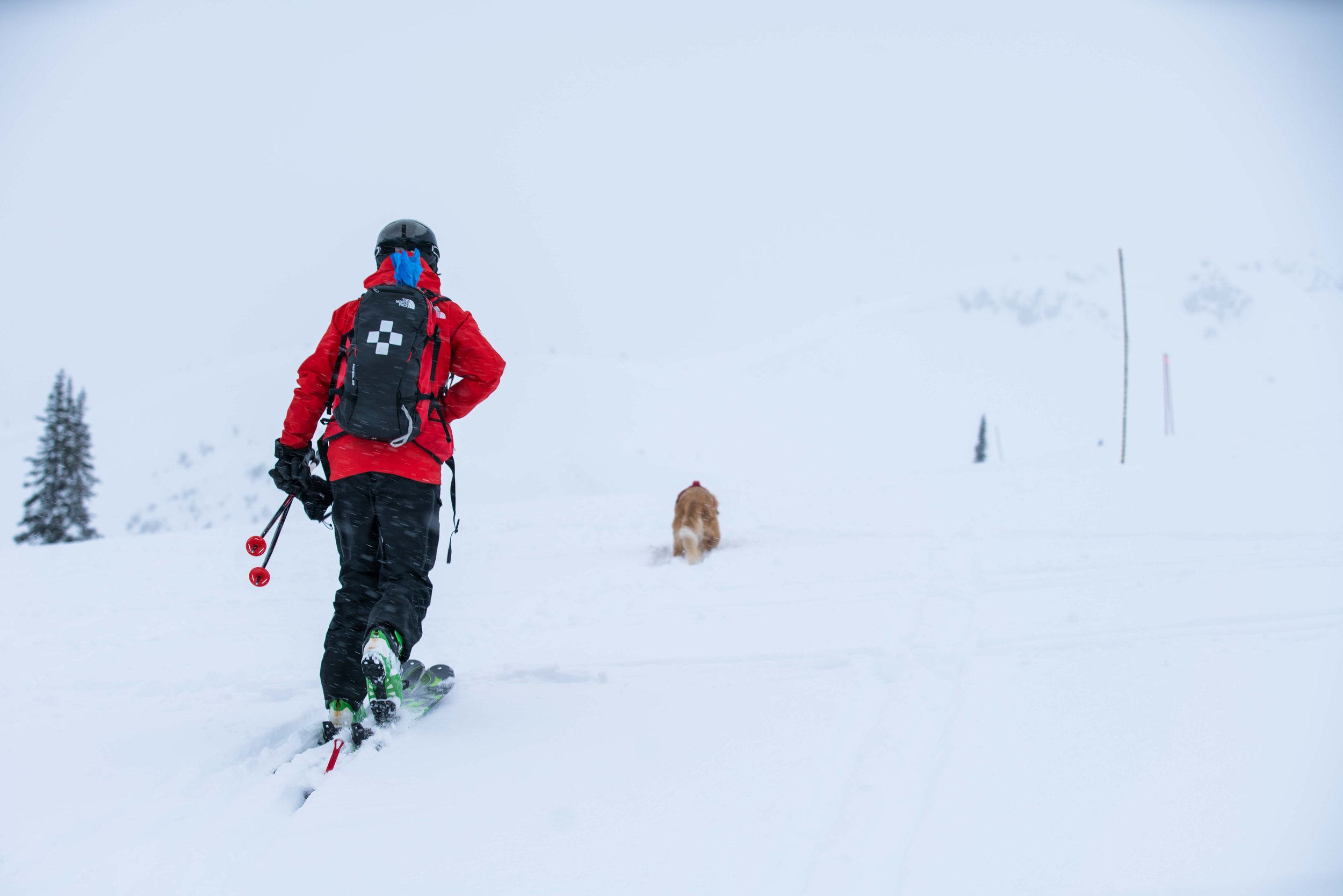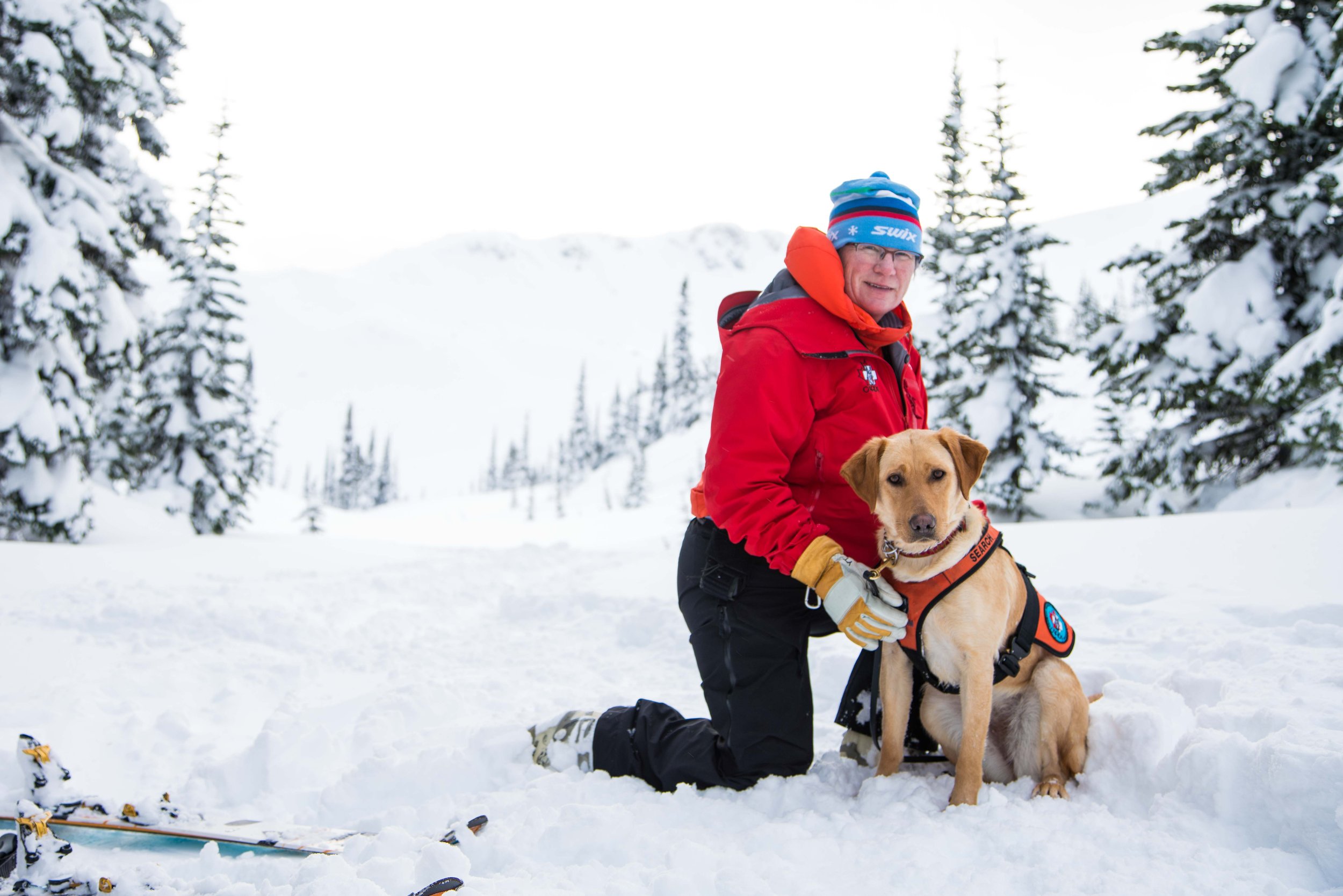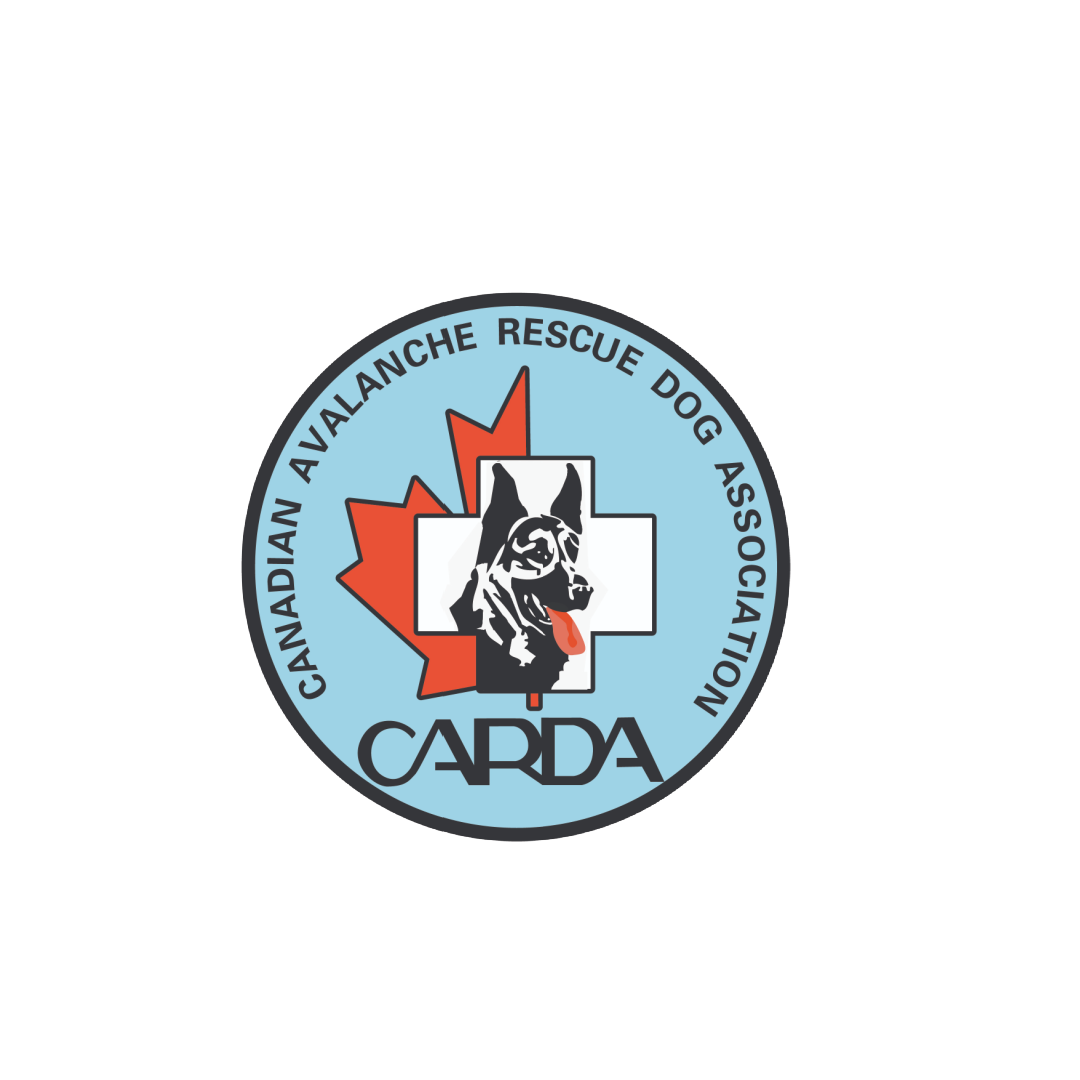
Join CARDA
Prerequisites
CARDA is a volunteer non profit charitable organization. Our goals are to train and maintain a network of highly efficient avalanche search and rescue teams across Canada.
In order to attend a CARDA training course, handlers must have the following prerequisites:
* Be registered with PEP and be an active member of a winter mountain rescue group
* GSAR certification or provincial equivalent
* Strong intermediate skier competent in basic ski mountaineering skills
* Training in all aspects of avalanche rescue
* 80 hour First Aid certification with CPR
* CAA Level 1 for Ski Operations avalanche course (minimum)
* Basic obedience training
* Dogs must be at least 1 year of age at time of first winter course
Handlers interested in entering the CARDA program must be either working in an avalanche related field or spending a lot of time in the backcountry in avalanche prone terrain in order to maintain the skill-sets required to work in this profile. The CARDA validation standard requires a handler to be able to perform decision making that is beyond the CAA level 1 course. CARDA generally holds a tracking/searching course in the spring and an avalanche search course sometime early winter. New teams entering the program must attend the spring course, usually held in early May or late April. At this time they will be assessed, and either recommended for the CARDA program or not. All prerequisites must be in place by the winter course- no exceptions. The CAA Level 1 for Ski Operations course must be in place before the spring course and a copy of the certificate must be sent with this application or with the spring course application. Winter course dates are decided in May. By joining CARDA you will receive all mail-outs giving information on upcoming courses.
For more information please contact info@carda.ca
Membership dues $30.00 / year. Please do not send until membership application is approved.

Choosing the Right Pup
Training a dog for the search and rescue profile is something you should be thinking about long before acquiring a pup. We highly recommend that you attend a spring or winter course without a dog to observe and quarry for the teams on the course. This will allow you time to observe the CARDA program as well as the different working breeds. You want to choose a breed that is suitable to your personality and the work the dog will be doing. Do not rush the process of choosing a dog. Starting with the right product is very important.
The following are some general hints to help you get going.
• Purebreds generally work out better than crosses.
• Select a suitable breed and a line with a working background. The following breeds have proven to be successful for avalanche search: German Shepherd, Border Collie, Belgian Malinois, Labrador Retriever, Golden Retriever.
• Let the breeder know what you are looking for in the dog. Confidence, strong prey drive, a desire to play tug of war and retrieve are some of the important characteristics needed for an avalanche SAR dog. PLEASE talk to a senior CARDA handler or contact an instructor for help in choosing a working pup.
• Once you acquire a pup, spend lots of fun time with him/her so that a strong bond develops.
• If you are living in a multi person household, make sure the pup knows that you are the handler of the dog. If other people are spending as much time with the dog as you are, a weaker bond may develop and the dog may not want to work as hard for you. If there are other pets in the household, let your pup socialize with them, but allow him/her to have lots of time with you away from them. Kennel the pup separately - don't let him/her be always lorded over by an older dog. The youngster needs a chance to develop a personality of its own. The pup must bond to you, the handler, not to another person or pet.
• Expose the pup gradually to as many different situations as possible. Spend time socializing with other dogs and people.
• Firmly discourage wild animal interest. No chasing (even squirrels), and discourage the pup from following animal tracks. Also discourage interest in spots where other dogs have urinated.
• Remember that it is going to be a working dog and not a pet. Couch-lounging, scrounging for food, and running loose in the neighbourhood are all things that your dog should not be doing. When your pup is not spending quality time with you then it is better off in its kennel. The ideal CARDA dog is somewhere between an RCMP dog and a family pet; life is not as regimented as that of a police dog, but much more structured than that of a pet.
We encourage you to be in contact with CARDA. Each of the different breeds has its own quirks and challenges - talk to someone who can give you more specific help if you need it.
The CARDA program requires that new potential handlers attend a spring assessment course. Dogs aged 6 months to 2 years will be accepted for assessment IF ALL THE HANDLER’S REQUIREMENTS ARE IN PLACE. We encourage handlers with dogs younger than 6 months to attend the course and get some training tips, but you will need to be reassessed before attending a winter course. Due to the training time required before a team may attempt a validation, dogs older than 2 years will not be accepted into the program.

Courses
CARDA holds training courses several times per year for members, and people who meet our dog and handler prerequisites. If you are interested in one of our courses, and meet the prerequisites, please contact courses@carda.ca
Spring Course
Generally held around the first week of May, before or after the Canadian Avalanche Association conference. The Spring CARDA course has been held in the Merritt, BC area for the past few years.
This three day weekend has several goals:
1. It is the organizations Annual General Meeting.
2. It serves as the initial assessment of new dog teams. Dogs between the ages of 6 months - 2 years of age, with the handler meeting the prerequisites, will be assessed for their suitability in the CARDA program. No prior search training on the dog’s part is required. It is generally a pass / fail course at this level, with passing teams getting permission to attend a winter course the next January as a potential Team-in-training.
3. There is also a group of “In Training” teams that attend the spring course. It is a place that intermediate teams come to get a “look see” from CARDA instructors to make sure that they are still on track in their training and get tips as they progress to their first validation attempt the following winter.
General Winter Course
This course is held at a ski resort in Western Canada usually each January (generally the second week of the new year). There are three groups of teams that participate:
1. Teams that were assessed and passed at the spring course come to their first winter course and form the “puppy group” or “beginner group”. Successful teams will receive an “In Training” certificate at the end of the week and will learn the skills needed to progress on their way to becoming a validated avalanche rescue dog team.
2. The “intermediate group” are teams that already hold an “In Training” status and are hoping to validate for the first time at this winter course.
3. The “advanced group” is made up of teams that have previously validated as an avalanche dog team with CARDA. These teams come to “re-certify” and to work on professional development, as required by the CARDA standard.
Advanced Course
This course is reserved for experienced teams, and usually involves a large backcountry component. The focus is on developing advanced mountain skills for handlers, and more complex search scenarios for dog teams to work through. Glacier travel, alpine winter camping and multi-dog searching is usually involved. The course location varies, as do dates. This course is generally held in late March or early April.
